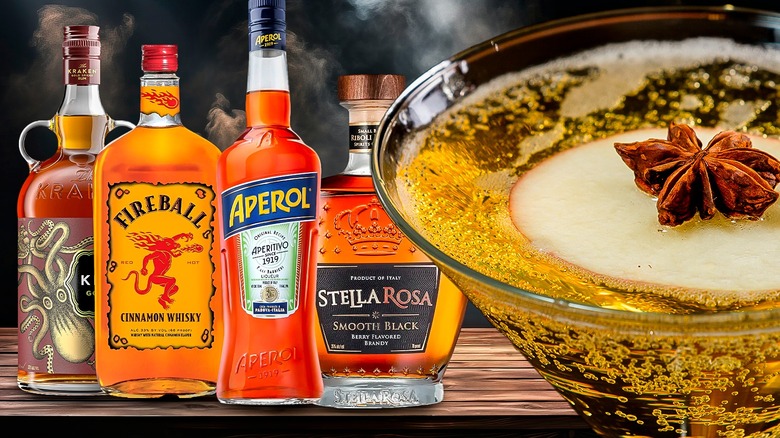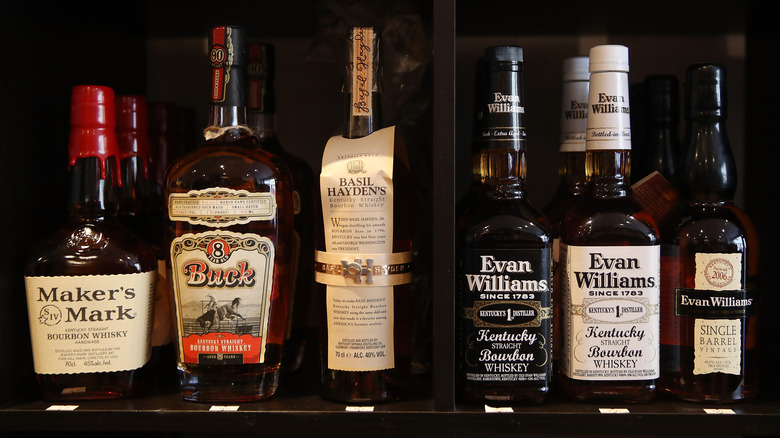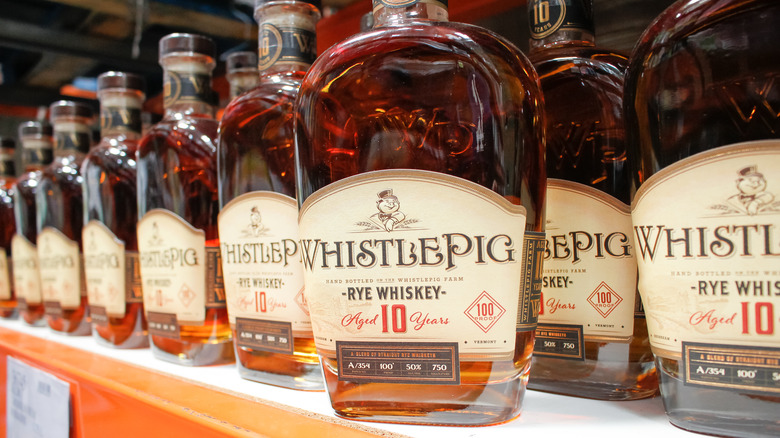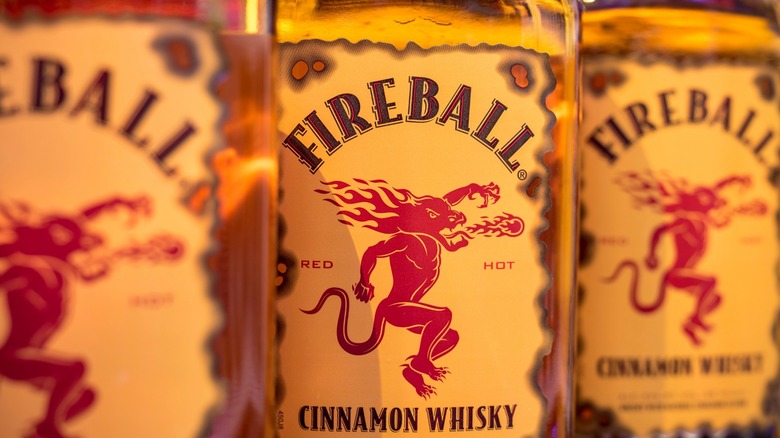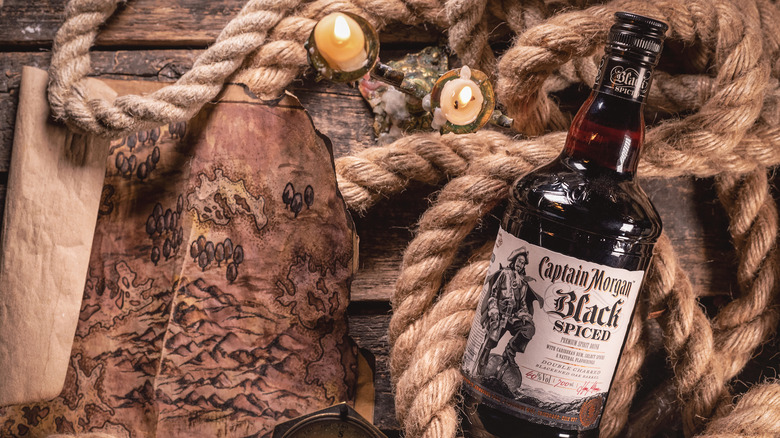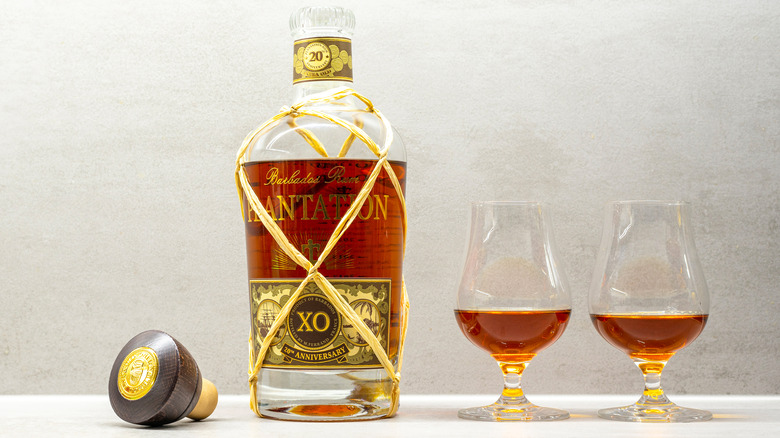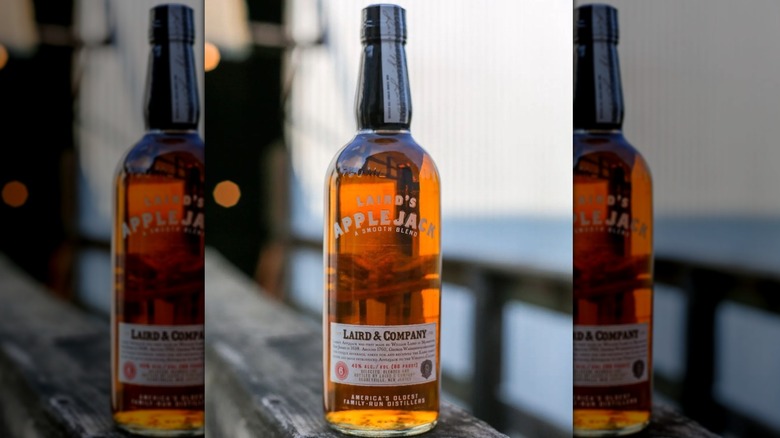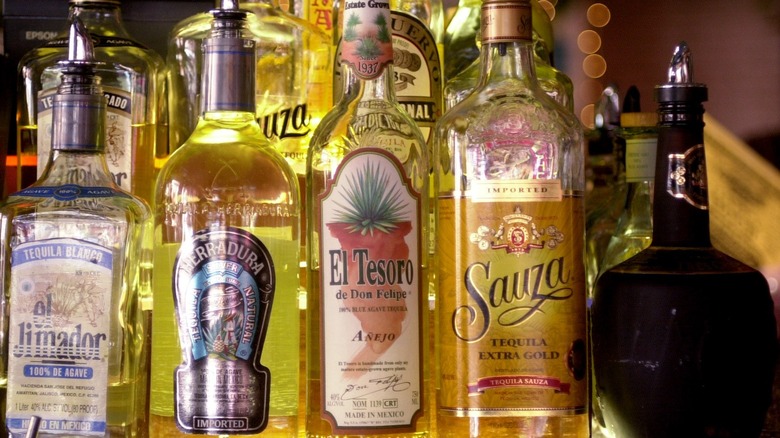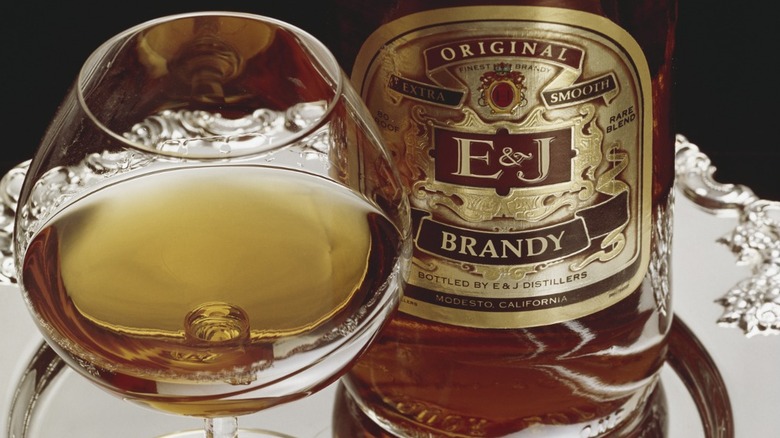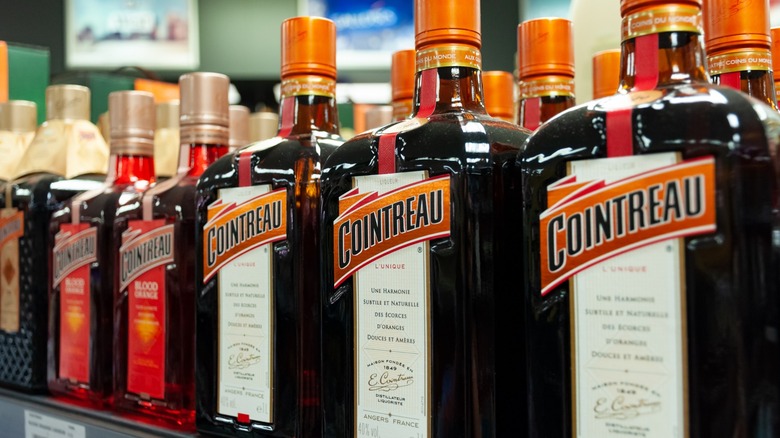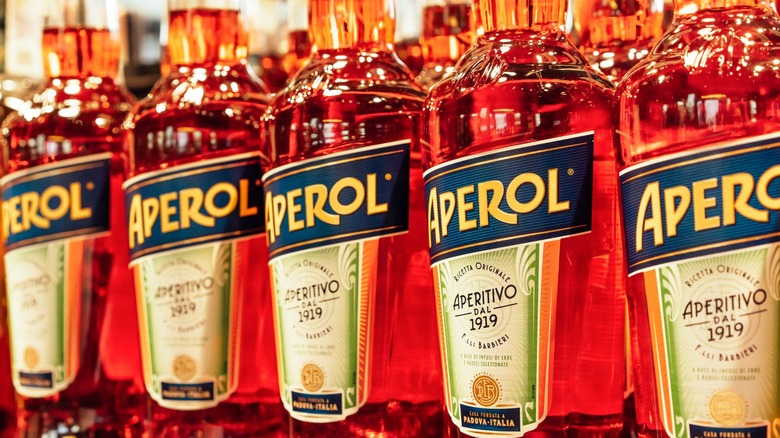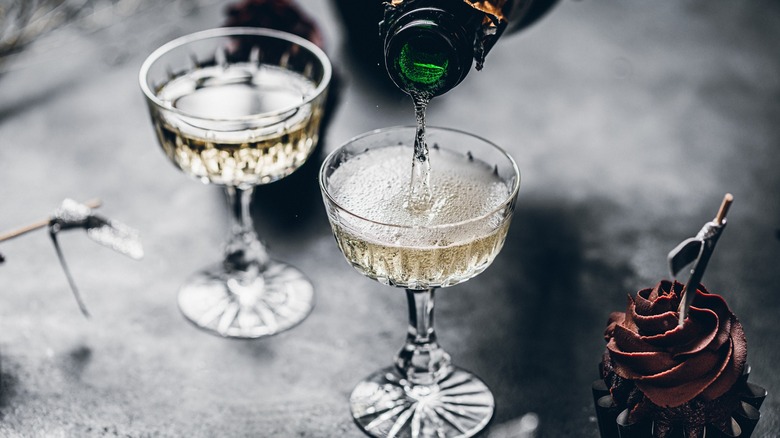12 Best Spirits For Spiked Cider
When the wind starts to blow and the leaves begin to change, and when sweaters and jackets are donned to ward off cooling temperatures, it can only mean one thing: Apples are in season. And with so many different types of apples, the ways to enjoy them are endless. You could whip up some sweet applesauce, bake an apple pie, or, our favorite, sip on a glass of apple cider.
We love drinking apple cider straight out of the fridge over ice almost as much as we enjoy sipping it out of a steaming hot mug. Full of spices and sweet fruit, apple cider is autumn in a glass. While cider on its own is absolutely delicious, there is one thing that can make it better: liquor. Spiked cider is a great drink option for parties, especially if you set up a serve-yourself bar so your guests can pick their favorite spirit. But which spirit goes best with apple cider? There are those who would pick bourbon or rye without batting an eyelash. But there are others who swear tequila or rum are the only ways to go.
It turns out that they're all right in their own ways. Each one of these spirits brings a different nuance and turns the classic cider into something really special — and which one you choose is totally up to you. We know staring at all those bottles on the shelf can be overwhelming, so we picked our favorites to help you out.
Bourbon
Often considered a fall or winter spirit thanks to its darker color and more intense flavor, bourbon is a great way to spike apple cider as it tends to be a sweeter spirit thanks to its mash bill. The mash bill is the list of grains that are used to make up this liquor as well as others in the whiskey family like scotch and rye. For bourbon, the mash must be made up of at least 51% corn. Even 1% less, and it's not bourbon. That other 49% can be any grain the brand wants, including more corn. That mash bill dictates the flavor of the spirit. So, if a bourbon uses more corn, it's naturally going to be sweeter and garner those great flavors of caramel and vanilla; two flavors that happen to pair amazingly well with apple cider.
But what we love about bourbon is the numerous brands available, each with its own flavor. Some will have hints of spice and wood, while others will be full of fruit and leather. Those different flavors will adjust the flavor of your cider. Sure, the apple will always shine through, but if you want to tone it down, then go with a bourbon like Four Roses or Bulleit. But if you'd like something a little sweeter that would make your cider taste more like apple pie, we'd recommend Maker's Mark or Pappy Van Winkle (if you can score a bottle of it).
Scotch
When it comes to whiskey, there are several different types. We've already covered bourbon, but there's also straight American whiskey, rye, and scotch. Scotch tends to have a more malty flavor since malted barley is one of its main components. But there's usually a smokiness associated with the whiskey, as well, thanks to the peat that's often used in its distillation process. The combination of malt and smoke makes it an ideal partner for apple cider since the malt brings out the sweetness of the apples while the smoke adds a nice warmth well suited to hot cocktails.
Just like bourbon, there are several different types of scotch whisky, and each one will have its own unique flavor. So it's up to you to decide which one will be your perfect pairing. The one thing we will recommend is that you use a blended scotch instead of a single malt. Single malts are best imbibed neat or over ice because they have such unique flavors that shouldn't be muddied by adding mixers. On the other hand, since a blend already has several different scotches or grains used to create its unique profile, it's better suited to be mixed with cider as the fruity sweetness of a cider will enhance the combination of flavors usually found in a blend.
Rye
Rye is another member of the whiskey family that pairs quite well with apple cider, especially if that cider has some spice to it. Where bourbon is sweet and scotch is smoky, rye is the whiskey we turn to when we want something with a little bite. That's because the difference between bourbon and rye, once again, comes down to its mash bill. Remember how we said that for a whiskey to qualify as a bourbon it had to be made up of 51% corn? Well, the same is true for rye. Except, in this case, the rye grain is substituted for corn. That large percentage of rye is what gives this whiskey its bite.
While ryes only need to have 51% of the grain to legally qualify as a rye whiskey, brands don't have to stop there. As a matter of fact, there are several that go well beyond that 51%. Kentucky Ryes, like Woodford and Rittenhouse, stick to the 50%s and would be perfectly fine added to a tall glass of apple cider. But brands like Angels Envy, Bulleit, and Templeton all use 95% rye in their mash bills. These are the ryes we'd recommend spiking your cider with as that spice will mellow out the sweetness of the cider while having a nice spicy finish.
Fireball Whisky
If you like your cider with a lot of cinnamon, then Fireball Cinnamon Whisky is the spirit for you. Yes, this whisky has some serious bite (its label does have a fire-breathing dragon on it, after all), thanks to all the cinnamon inside. So, it just makes sense to add a shot to a tall glass of apple juice. After all, we can't think of a better spice to pair with the fruit than this one.
But what we especially appreciate about this liquor is that, unlike so many flavored spirits out there, there is absolutely nothing artificial inside these bottles. Fireball uses only real cinnamon to give this whisky its distinct flavor. The other thing we like is that you have options with this spirit. If you want a cocktail, go with the original whisky which has some kick thanks to its 33% alcohol by volume (ABV). But if you'd prefer something a little lighter, Fireball has recently come out with two other versions that have a lower alcohol content. One is a wine-based liquor containing only 21% ABV, while the other is a malt beverage that comes in at a very low 16.5. But even if you choose a lower ABV, you're still guaranteed the same amount of cinnamon.
Spiced Rum
Another great spirit option if you're a fan of nutmeg, allspice, and cinnamon is spiced rum. The minute we open a bottle, the smell transports us to a log cabin and a roaring fire. We just can't wait to pull on our flannel pajamas and sip it over ice — but it's even better when added to a flavorful glass of cider. Those autumn and holiday notes all come from the variety of spices often used when creating these rums. Yes, there's usually some combination of nutmeg, allspice, and cinnamon, but depending on the brand, you can also find vanilla, cloves, and maybe even some cardamom or pepper.
While you probably know Captain Morgan thanks to its mascot and the fact that it's been around since 1944, there are several other brands out there to consider, as well, as each comes with its own distinct spice mixture and flavor. Even Captain Morgan has expanded its line to include not one but four different spiced rums. So, no matter which brand you choose, it's a wonderful addition to that glass of cider because it's just so easy: No mixing or steeping is necessary, since all those yummy spices are already in the bottle. Simply pop the cork and pour it into your cider-filled glass. With a recipe like that, why wouldn't you keep a bottle on hand?
Aged Rum
Similar to spiced rums, aged rums also have darker, caramel-colored tones. But that color doesn't come from the spices that are added to the liquor; that color is achieved by the aging process. After the rum is distilled, it's poured into barrels where it sits for anywhere from three years to decades. The longer it sits, the darker it becomes, and the more flavor it garners.
While these rums may lack the spice you desire in a cider cocktail, they definitely don't want in flavor. Since the rum itself comes from sugarcane, aging enhances the sweetness of the sugarcane and gives it delightful notes of vanilla and caramel. Sometimes you can even detect hints of citrus, almond, or coconut — all flavors that pair well with apples. Those flavors will become even more apparent once mixed with the cider because its sweetness not only balances out the flavors from the rum, it highlights them, thereby creating a drink that's perfect any time of year.
Applejack
Many whiskeys have tried adding apple flavoring to their lines with mixed results. But if you're looking for an apple whiskey made with actual apples, look no further than the only tried and true apple whiskey: Laird's Applejack. This liquor, made from a blend of Laird's apple brandy and neutral grain spirits, has been around since before the American Revolution when the Laird family started "jacking" the apple cider from their orchard. "Jacking" refers to the process of fermenting apple (or any fruit) cider by freezing it, then skimming off the ice, leaving behind a fermented liquor. A liquor that was full of rich apple flavor which many people, including George Washington, enjoyed straight or on the rocks.
While Laird's has since created numerous liquors under its moniker, nothing is better suited for spiking your apple cider than the original. After all, if you have a whiskey made from actual apples, why wouldn't you add it to a beverage made of apples? We say the more apples the better, especially if those little green and red spheres are your favorite fruit. Even though Applejack has a kick to it, its intense apple flavor only enhances the cider making it the most appley of apple ciders.
Tequila
Tequila may seem like an odd choice when considering liquors to add to your cider, but not when you examine the flavors of the spirit itself. Yes, tequila, which comes from the agave plant, has earthy and herbal notes, but it also has subtle fruity notes that go quite well with apples. Some of those notes include citrus (which is why it's so often paired with oranges, lemons, and limes in margaritas), but you can also find subtle hints of stone fruit, bananas, and even apples. And that's just in your basic Blanco tequila.
There are five other types of tequila available, and with each version comes a different flavor. Some will be more fruit-forward, while others will be significantly more subtle. So, while a shot of tequila would definitely put a different spin on that hot mug of spiced cider, a cider margarita with a little cinnamon or salt on the rim would be a nice alternative to the classic lemon and lime margarita we've all been drinking since college, especially if you choose an añejo or reposado.
Brandy
Unlike a lot of the spirits we've discussed here which are grain-based, brandy is made by fermenting fruit. You may think that that means it will have a lower proof similar to wine, but it turns out that the alcohol by volume or ABV of brandy ranges from 40% to 50%, which means it ranks up there with the other hard liquors on this list. Although this liquor found its humble beginnings in a vineyard, today, you can find a brandy made with just about any fruit on earth. Yes, there are even apple brandies. So, since we're working with a beverage that comes from fruit, why not enhance it with a fruit-based spirit?
The benefit (for better or worse) of using brandy as opposed to whiskey or tequila is that the final tipple will be a drink where the alcohol will be well hidden. These are the best drinks for those who aren't fans of strong cocktails. Since you're using a fruit-based brandy, you'll get all the fruit flavor without any of that harsh liquor aftertaste that sometimes accompanies whiskeys and tequilas. Now, as with all types of alcohol, which type of brandy you choose will alter the final cocktail. We said there are apple brandies, but there are also pear, grape, peach — the list goes on and on. Depending on which brandy you choose, you could end up with a fruit salad cocktail that we think could be quite intoxicating.
Cointreau
When it comes to pairing flavors, nothing goes better together than oranges and apples. And there's no better orange liqueur on the market than Cointreau. Not to be confused with Triple Sec or Grand Marnier, Cointreau is the premier orange liqueur that has the right amount of orange flavor without being overly sweet, which is pretty surprising considering the spirit was created by a French candy maker, Adolphe Cointreau, back in 1857.
We prefer Cointreau over other orange liqueurs because of its intense orange flavor. An intense flavor that can stand up to the sweetness of your typical apple cider without overpowering it. Instead, it creates a wonderful sweet yet tart balance that delights every part of your palate. The liqueur has an alluring tang that makes us believe actual oranges were used during its creation. There's absolutely nothing artificial about it, which we appreciate, because that means the final cocktail will be full of delicious acidity without any of those strange aftertastes we sometimes encounter with other citrus liqueurs.
Aperol
If you like your orange with a bitter bite, then we'd recommend adding an ounce or two of the aperitivo, Aperol, to your glass of apple cider. Aperol is the less bitter cousin to that other aperitif from Italy, Campari, which is why it's a great choice if you're looking to get your feet wet in the aperitif world. An aperitif is a cocktail that's meant to be imbibed before a meal in order to stimulate your appetite. And that's just what Aperol does: Its flavors get the salivary glands working and prepare the palate for the main event.
But we love it because of its strong orange tang and bittersweet finish. While this liqueur does have an intensity all its own, the bitter orange flavor won't get lost in the cider. Instead, it will add strong notes of orange rind that will couple with the sweet apple cider thanks to the decent amount of sugar included in the aperitif. And since the Aperol Spritz is still enjoying its recent surge in popularity, why not update it by adding a couple of shots of apple cider? The end result will be a cocktail we're sure you'll enjoy for years to come.
Champagne
Who doesn't enjoy a glass of bubbly? There's just something about a fizzy cocktail that makes us smile, as it tends to bring festivity to your standard brunch, lunch, or dinner. While it's often reserved for celebrations, there's nothing wrong with popping the cork just because. As a matter of fact, Champagne pairs incredibly well with several dinner dishes including a nice, rich steak.
But better than a plain glass of Champagne is a Champagne cocktail, and what's the most popular Champagne cocktail? Why, the mimosa, of course. Even though we adore the classic, we also enjoy putting interesting spins on drinks, and we definitely think substituting orange juice with a sweet spiced cider is an interesting spin. While you won't have that shot of tart citrus to wake you up at your next brunch, you'll still get a healthy dose of vitamin C. And because apple cider tends to be sweeter than the standard orange juice, it will balance out the dryness of the Champagne.
Even though all mimosas are equal parts Champagne to fruit juice, which bubbles and which cider you use is entirely up to you. Want a sweeter mimosa? Pick a sweeter clear cider and pair it with Prosecco. In the mood for something a little drier? Go with a Brut Champagne and a cloudy cider that has a bit more spice. But whichever combination you pick, this cocktail will be the perfect way to turn that ho-hum brunch into something really special.
